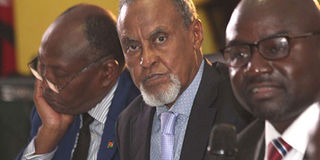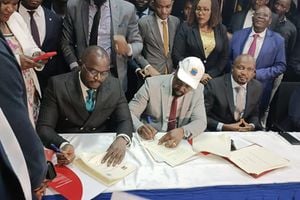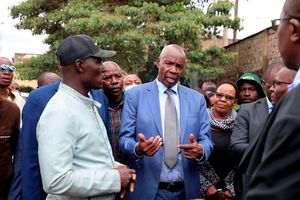Careful, this vote may be worse than the disease it seeks to cure

The Building Bridges Task Force listens to views from lawmaker Mary Yiane Seneta at KICC on August 6, 2019. It is hoped that its members have done a diligent job. PHOTO | FILE | NATION MEDIA GROUP
What you need to know:
- And no sane Kenyan, except those steeped in grand corruption and other forms of malfeasance, would oppose more robust measures to curb the devastating menace.
- It would be naïve to think that things must get worse before they get better. The venal nature of the Kenyan politician will not mysteriously improve, nor will the gullibility of the voter change.
For quite some time now, many Kenyans have been talking about the Building Bridges Initiative (BBI) report whose release is due soon.
They simply cannot understand why those who championed the initiative, President Uhuru Kenyatta and ODM leader Raila Odinga, have been rather coy about releasing the details in the report.
As a result, speculation about its contents has become rife, sometimes very uninformed. But pretty soon, the cacophony is about to get very serious.
What is amusing is that even if the report was released tomorrow, a majority wouldn’t know what to do with it.
There are those who support it merely because their political party leaders tell them it is a good thing, and then there are those who oppose it just because they have come to believe that it is meant to undermine a particular political player.
Then there is the third class of people, mainly pseudo-intellectuals, whose knee-jerk reaction has been to oppose it because they make a living out of poking holes in every initiative that is not in conformity with their own views, or those of their financiers.
ELITE'S VIEWS
While it is true that the BBI task force was supposed to seek people’s views around the country, and they did so in all the 47 counties, it is not clear how representative the whole process really was, since it consisted of listening to well-crafted papers eloquently delivered by a relatively small elite using kizungu mingi.
There is no way the hoi polloi could have made their views known; they had to rely on political, business and religious leaders to tell them what to think.
As a result, the “people’s views” were in reality those of the elite, making the buzz-phrase “public participation” nothing of the kind.
Maybe a series of town hall meetings across the republic during which the common people spoke their minds in local tongues would have been more representative of Wanjiku’s views, but then the task force did not have all the time in the world to do the job.
This logistical problem means that the views collected were mainly those of politicians, academics, lawyers and civil society activists.
All these are interested parties in the outcome, but those interests may not necessarily correspond with those of ordinary Kenyans.
CREDIBILITY
Those who delivered lengthy academic papers were not thinking of how they would get the next meal, how to pay next term’s school fees, or even when they will ever get jobs.
They were more worried about how many levels of government were suitable for the country, whether the new dispensation would do away with top-heavy representation, how many regional governments are ideal to make devolution work, and whether a prime minister is preferable to a president.
At this stage, it would be foolish to second-guess the findings of the BBI task force.
It is hoped that its members have done a diligent job free from interference by people who are only interested in remaining at the top of the food chain.
There is nothing really wrong with aspiring for an end to ethnic antagonisms that pit communities against each other during elections.
DEVOLUTION
There could be no harm in electoral reforms to ensure the person who gets the majority votes also gets to form the next government.
Election rigging or perceptions to that effect have made our five-year rituals almost meaningless, leaving too many people bitter and resentful.
Devolution has proved to be one of the ways in which real development can be felt by everyone at the grassroots, provided counties are given adequate allocations by the national government and the money is used well and not stolen or misappropriated by governors and their henchmen.
Nobody would quarrel with the need to ensure the country’s security and territorial integrity.
And no sane Kenyan, except those steeped in grand corruption and other forms of malfeasance, would oppose more robust measures to curb the devastating menace.
REFERENDUM
However, it is not certain that a referendum at this point is the best way forward for this country.
In essence, it is a form of election in which people get to choose between one system of governance over another, and it has all the hallmarks of the extremely divisive elections we have held in the past.
It would be naïve to think that things must, of necessity, get worse before they get better; the venal nature of the Kenyan politician will not mysteriously improve, nor will the gullibility of the voter change.
However, it seems the majority of Kenyans have been sold on the idea.
I am no doomsayer but if a referendum is held, there is no guarantee it won’t again tear the country right down the middle, and the medicine prove to be worse than the disease.
But should the vote be the consensus of the majority, bring it on. However, Deputy President William Ruto and his supporters are not exactly ecstatic about a referendum because they believe it is expressly aimed at scuttling his legitimate 2022 ambitions to benefit Mr Odinga and his team and they are likely to reject it. So what happens next?
Mr Ngwiri is consultant editor. [email protected]





